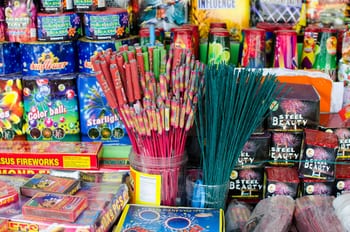
Florida’s Gaping Fireworks Law Loophole
Each year, Americans across the country celebrate the Fourth of July in style, spending up to a billion dollars on fireworks. Launching airborne fireworks that explode in fun shapes and colors to celebrate our nation’s independence is a tradition for many families; but did you know that these types of explosives are illegal in the Sunshine State?
Many Orlando residents are unclear about the legality of real fireworks in Florida, as dozens of pop-up shops and roadside stands selling nothing but the good stuff sprout like weeds in the weeks leading up to Independence Day. Although state law prohibits devices that shoot up in the air, explode, and emit sparks, exceptions are made for groups and organizations that obtain permits from local governments to coordinate public fireworks displays, and for people working on railroads.
Shops that sell fireworks exclusively may legally operate because a section in the law allows retailers to sell fireworks to organizations like these for licensed demonstrations and ceremonies at sporting events. But what about the average Joe? How does he get his hands on mesmerizing explosives and get away with it? As it turns out, there is a gaping loophole in the state’s fireworks law.
Florida Fireworks Law
The 2018 Florida Statutes define fireworks in Chapter 791, Section §791.01 as “any combustible or explosive composition or substance or combination of substances or any article prepared for the purpose of producing a visible or audible effect by combustion, explosion, deflagration, or detonation.” The definition specifically references “blank cartridges and toy cannons in which explosives are used,” as well as “firecrackers, torpedoes, skyrockets, roman candles, dago bombs, and any fireworks containing any explosives or flammable compound or any tablets or other device containing any explosive substance.”
It’s a mouthful to state that any device that launches into the air and explodes is prohibited. It’s important to note that the stuff they sell at big box stores, like sparklers, snappers, party poppers, snakes, and other small novelties do not fall under this definition and thus are perfectly legal.
Under Florida Statute §791.02, the use of prohibited fireworks is unlawful. This offense may be charged as a first-degree misdemeanor offense, punishable by up to one year in jail and a fine of $1,000.
Although there are penalties for illegally purchasing and using fireworks, hardly anyone is ever arrested for this offense. To face charges related to illegal fireworks, a police officer must witness a person lighting them. Officers who are called to address fireworks complaints more often place people under arrest for illegal drug possession and other crimes than for using fireworks.
If You’re Scaring Birds, You’re Good to Go
Of the exceptions for the purchase and sale of fireworks recognized in the Florida fireworks statute, one, in particular, provides an easy path for everyday consumers to get their hands on the powerful explosives they seek. Floridians who buy fireworks in the state sign a waiver stating that they understand state laws surrounding fireworks and they’re purchasing the fireworks for agricultural purposes that include scaring birds away from fish hatcheries and crops. Fireworks sellers often ask customers to confirm the purpose of their purchases, but they are not liable for verifying the accuracy of these forms, as established in The State of Florida vs. John Miketa.
Fireworks Retailers Do Not Verify Fireworks Purchase Waivers
In State vs. Miketa, the State charged the owner of a fireworks shop, John Miketa, with the illegal sale of fireworks to an undercover detective who patronized his store in the Keys. The case made it to the Third District Court of Appeal, which ruled that it is not the seller’s responsibility to check the veracity of a buyer’s form. Since this ruling in 2002, Florida fireworks sales have surged.
Orlando Criminal Defense Lawyers Wish You a Safe Fourth
Fireworks arrests don’t happen very often, but police officers do have a duty to keep illegal fireworks out of the hands of ordinary civilians. It’s not unheard of for police officers to press charges for minor offenses on celebratory occasions. If you face legal trouble, don’t hesitate to contact The Umansky Law Firm.
Our team of attorneys is made up of former prosecutors who have more than 100 years of combined experience representing clients facing criminal charges in Orlando. Our lawyers are highly engaged in the legal community, and some are members of the Florida Association of Criminal Defense Lawyers and the Orange County Bar Association. Contact us for a free consultation at any time of day or night or complete our contact form.


